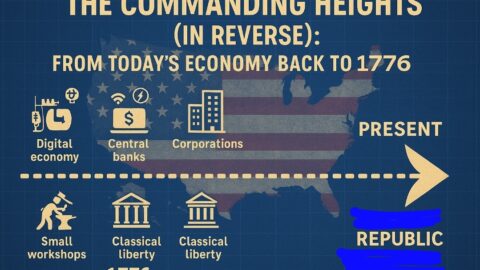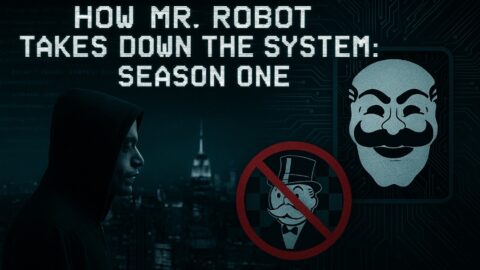“The natural progress of things is for liberty to yield, and government to gain ground.” — Thomas Jefferson
Thomas Jefferson reflects a cautious perspective on the growth of government power and its potential impact on individual freedoms.
Key Points:
- Natural Progression: Jefferson suggests that governments have an inherent tendency to expand their authority over time, often at the expense of personal liberties.
- Liberty vs. Authority: This statement highlights the tension between individual freedoms and governmental control. As governments grow and take on more responsibilities, there is a risk that personal liberties will be eroded.
- Historical Context: Jefferson’s view is rooted in the context of his time, influenced by his experiences with colonial rule and the fight for American independence. It reflects a wariness of centralized power and an emphasis on safeguarding individual rights.
Implications:
- Vigilance: Citizens must remain vigilant and proactive in defending their liberties against the encroachment of governmental power. Continuous oversight and advocacy are necessary to maintain a balance.
- Constitutional Safeguards: Robust constitutional frameworks that limit government power and protect individual rights are needed. Mechanisms such as the Bill of Rights and judicial review are designed to prevent government overreach.
- Checks and Balances: Implementing and maintaining checks and balances within the government ensures no single branch or entity becomes too powerful. This principle is a cornerstone of the U.S. political system.
- Civil Liberties: Protecting civil liberties and human rights is fundamental to a free society. Ensuring that laws and policies respect these rights is crucial to preventing government overreach.
Modern Relevance:
- Expansion of Government Roles: In contemporary times, governments often expand their roles in response to various challenges such as economic crises, national security threats, and public health emergencies. Each expansion can lead to a potential reduction in individual freedoms.
- Surveillance and Privacy: Government surveillance and privacy issues have become prominent in the digital age. There is ongoing debate about the balance between national security and personal privacy.
- Regulation and Freedom: The growth of regulatory frameworks intended to address issues like environmental protection, financial stability, and public safety must be balanced against preserving individual freedoms and economic liberty.
Jefferson’s warning serves as a reminder of the delicate balance between maintaining a functional and effective government and preserving individual liberties. It underscores the importance of constitutional safeguards, vigilant citizenry, and institutional checks and balances to prevent the natural tendency of government to encroach upon personal freedoms. This perspective remains relevant today as societies navigate the complexities of governance in an ever-changing world.
“Experience hath shewn, that even under the best forms of government those entrusted with power have, in time, and by slow operations, perverted it into tyranny.” –Thomas Jefferson
Thomas Jefferson reflects a deep-seated concern about the corrupting influence of power. Here’s an analysis of this idea:
Key Points:
- Corruption of Power: Jefferson highlights that power, even when initially held by well-intentioned individuals within a sound system of government, tends to become corrupted over time.
- Slow Erosion: The perversion of power into tyranny is often gradual, occurring through slow and subtle processes rather than sudden shifts. This makes it more challenging to recognize and resist.
- Historical Insight: This view is informed by historical examples of governments that started with noble intentions and eventually devolved into oppressive regimes.
Implications:
- Continuous Vigilance: Citizens and institutions must remain vigilant in monitoring those in power to prevent the gradual erosion of freedoms and the onset of tyranny.
- Institutional Safeguards: Establishing and maintaining vigorous institutional checks and balances is essential to prevent the concentration and abuse of power. This includes a robust legal system, independent judiciary, and free press.
- Periodic Review and Reform: Regular review and potential reform of governmental structures and practices can help address emerging abuses of power and adapt to changing societal needs.
- Education and Awareness: Educating citizens about their rights and the mechanisms of government can empower them to recognize and resist abuses of power.
Modern Relevance:
- Government Overreach: In contemporary politics, the risk of government overreach in surveillance, law enforcement, and executive powers is a constant concern. Public scrutiny and legal challenges are vital to counteract these tendencies.
- Authoritarian Tendencies: Around the world, there are examples of democratic institutions being undermined by leaders who consolidate power and erode checks and balances. International awareness and support for democratic principles are crucial.
- Civil Liberties: Protecting civil liberties against incremental encroachments by the state remains a fundamental issue. Organizations that advocate for civil rights play a critical role in this effort.
- Political Accountability: Ensuring that political leaders are held accountable for their actions through elections, transparency measures, and investigative bodies is essential to maintaining the integrity of government.
Jefferson’s warning about the potential for power to corrupt, even within the best forms of government, underscores the need for constant vigilance, robust safeguards, and active citizen engagement to prevent the slide into tyranny. His insight remains highly relevant today, serving as a reminder of the delicate balance between effective governance and preserving individual freedoms.
The concept that “power tends to concentrate” observes power dynamics within organizations, societies, and governments.
Key Points:
- Human Nature and Ambition: Individuals or groups in positions of power often seek to expand and solidify their influence. Ambition and the desire for control can drive this concentration of power.
- Institutional Dynamics: Without checks and balances, institutions may naturally evolve to concentrate power in fewer hands. This can occur through the centralization of authority, accumulation of resources, or monopolization of decision-making processes.
- Historical Patterns: Throughout history, many political systems have shown a tendency for power to centralize, often leading to autocratic or oligarchic rule. This pattern is seen in monarchies, dictatorships, and even some democratic systems with weak checks and balances.
Implications:
- Risk of Tyranny: Concentrated power can lead to tyranny or authoritarianism, where a single ruler or a small group exerts control over a society, often at the expense of individual freedoms and rights.
- Corruption and Abuse: Power concentration can increase the risk of corruption and abuse, as fewer individuals or groups can act without accountability or oversight.
- Inequality: When power is concentrated, it often leads to unequal distribution of resources and opportunities, exacerbating social and economic disparities.
- Resistance and Revolt: Over time, concentrated power can provoke resistance or revolt from marginalized or oppressed people, seeking to redistribute power more equitably.
Mechanisms to Prevent Power Concentration:
- National Separation of Powers: Dividing government into separate branches in the national government (executive, legislative, judicial) ensures no single entity has total control. The national government is entrusted with defending the nation and its foreign and federal relations between the state governments.
- State Separation of Powers: The State governments are responsible for the civil rights, laws, police, and administration of what concerns the State generally.
- County Separation of Powers: The counties with the local concerns of the counties, and each ward direct the interests within itself.
- Checks and Balances: Implementing systems where different branches or parts of an organization can monitor and limit each other’s power.
- Dividing and Subdividing the Republics to the Family Farm: It is by dividing and subdividing these republics from the national government down through all its subordinations until it ends in the administration of every man’s farm by himself by placing under everyone what his eye may superintend that all will be done for the best.
- Decentralization: Distributing power across various levels of government (federal, state, local) or within organizations to prevent centralization.
- Democratic Processes: Ensuring regular, free, and fair elections, along with protections for civil liberties, to keep power accountable to the people.
- Transparency and Accountability: Promoting transparency in decision-making and holding leaders accountable for their actions through laws, regulations, and oversight bodies.
Recognizing the tendency of power to concentrate is crucial in designing systems and institutions that promote equitable power distribution, protect individual rights, and ensure sustainable, democratic governance. This understanding informs the foundational principles of many modern political systems and organizational structures in a republic.
“No, my friend, the way to have good and safe government is not to trust it all to one, but to divide it among the many, distributing to every one exactly the function he is competent to.
“Let the National Government be entrusted with the defence of the nation and its foreign and federal relations; the State governments with the civil rights, laws, police and administration of what concerns the State generally; the counties with the local concerns of the counties, and each ward direct the interests within itself.
“It is by dividing and subdividing these republics from the great national one down through all its subordinations, until it ends in the administration of every man’s farm by himself; by placing under every one what his own eye may superintend, that all will be done for the best.” — Thomas Jefferson, Letter to Joseph C. Cabell Letters, p. 1388. 1816







One Response
Nice blog here Also your site loads up fast What host are you using Can I get your affiliate link to your host I wish my web site loaded up as quickly as yours lol